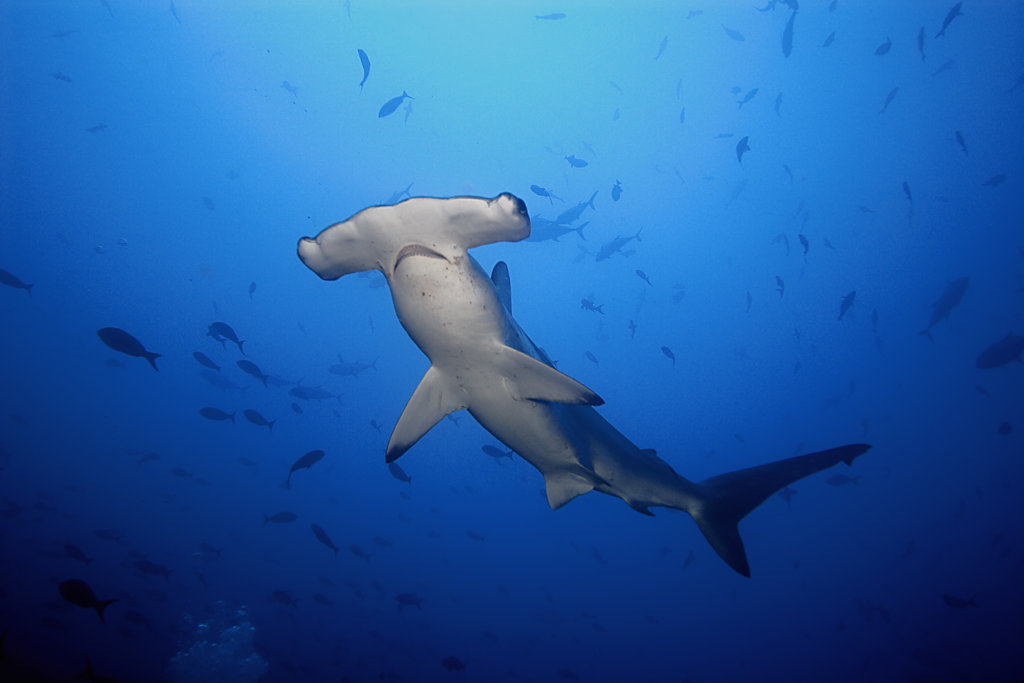The Australian Marine Conservation Society (AMCS) and the Northern Territory Seafood Council commend the Northern Territory government for important sustainability reforms in the Territory’s shark fishery. Reforms include strengthening the management of the fishery as well as better protecting unique Territorian marine wildlife.
The fishery primarily targets grey mackerel and blacktip shark with an incidental bycatch of non-targeted threatened shark species like the endangered scalloped hammerhead, sawfish and dolphins.
The NT government had been lagging behind other Australian and international jurisdictions in ensuring illegal, live-finning of sharks isn’t happening at sea. The new management framework imposes stricter regulation by enforcing a ‘Fins Naturally Attached’ (FNA) policy, in line with international and national best practise. FNA means that sharks must be brought back to land with the fins attached to the shark body, which has been shown to greatly reduce illegal targeting, dumping of unwanted sharks at sea, and prevent live shark finning.
Dr. Leonardo Guida, Senior Sharks Campaigner at AMCS said, “As of today, the Northern Territory has taken positive steps to ensure the public can be confident that cruel and illegal live-finning is not happening at sea. We congratulate the NT government for moving in line with best-practice shark fishing.”
Hammerhead shark fin is one of the most prized in the fin trade. If hammerheads are being caught, then best-practise needs to align with official scientific recommendations to keep fins attached to the body to better regulate the international trade in endangered wildlife.
Dr Guida said, “The Top End is a unique part of Australia, a remarkable mix of natural and cultural values cherished by Territorians and visitors alike. This reform, in step with the NT Government’s soon-to-be-released Coastal Marine Management Strategy, is an encouraging step towards the sustainable management and protection of our unique Top End coasts”
“We expect the reforms implemented in this fishery relating to fins naturally attached to be replicated in other Territory-managed fisheries that also catch sharks. In order to provide Territorians and the wider seafood market with confidence in NT fisheries management, we want to work with other fisheries to ensure no shark can be illegally live-finned at sea in all Territory waters.”
“These reforms are a crucial step towards strengthening the protection of critically endangered sharks, sawfish, and threatened populations of snubfin dolphins. Improved threatened species protection in fisheries will build public trust and help NT fisheries develop a reputation as a source of premium, sustainably sourced seafood products.”
Katherine Winchester, CEO of the NT Seafood Council said, “With fishing operations occurring in areas shared with threatened and endangered protected species, interactions with fishing vessels or fishing gear are unfortunately something that can occur from time to time. Bycatch is not an outcome anybody wants.The Territory fishing industry are committed to reducing the impact of fishing on endangered and protected species, and consider these reforms to be an important part of the process.”
For Media contact:
AMCS: Leonardo Guida 0400 896 567
Additional notes
- The shark fishery is known officially as the Offshore Net and Line Fishery (ONLF). As the name indicates, the fishery uses longlines and gillnets to catch mackerel and sharks.
- The Northern Territory, Queensland and Western Australia are the only jurisdictions in Australia that do not have a ‘fins naturally attached’ written in to legislation. They currently use a fin-to-body weight ratio of approximately 5%.This means fins can be cut off a shark at sea providing the animal’s trunk or fillets are retained.
- Fins naturally attached also improves fisheries management by better improving species identification at port. Fins are distinctive and a key feature used to identify species, particularly those which look very similar (eg. species of hammerhead shark; species of black-tip sharks). Without a head or tail, fins are the primary means of accurately identifying a shark. Accurately identifying sharks ensures endangered species’ are not being caught illegally, and so that populations can be better quantified and managed.
- Currently, the US, EU, and several Mediterranean countries have a fins naturally attached policy. Countries such as India, Costa Rica, and South Africa have a fins naturally attached policy in place despite having arguably poorer fisheries management than Australia.
